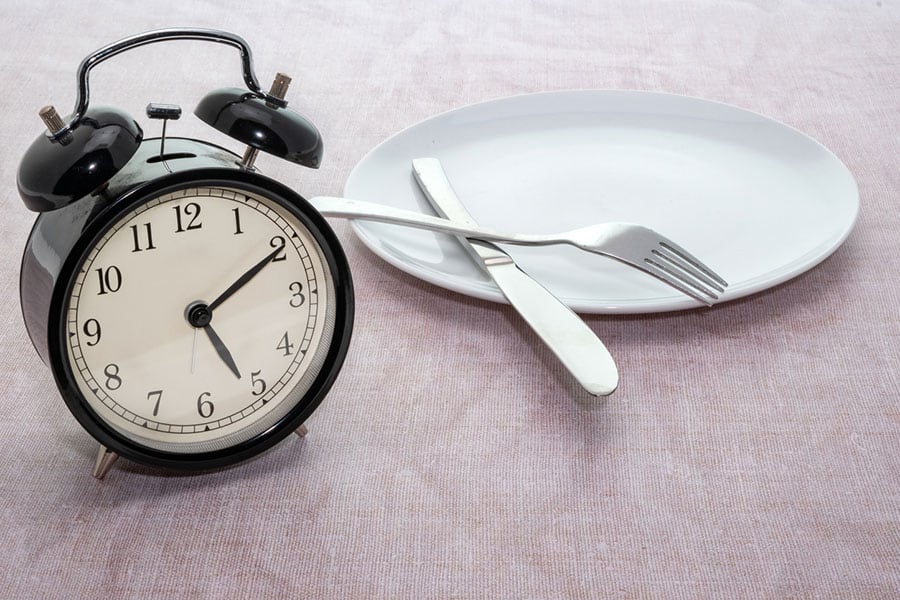48 Hour Fast – Process, Benefits, Drawbacks, Tips

48 hour fast | How to do | Health benefits | Drawbacks | Tips | 48-hour vs 72-hour | who should try | who should not try | FAQs
Many ideas and opinions exist regarding losing weight and living a healthy lifestyle.
Although adequate exercise and good nutrition play a significant role in your weight loss journey, there is more we need to consider.
Even though fasting has been a practice for centuries, it has recently gained popularity for weight loss.
Let us know everything you need to know about 48 hours fast.
What is 48 hour fast?
A 48-hour fast is an extended form of intermittent fasting where you do not eat or drink anything except water for 2 days (48 hours). This longest fasting duration within the intermittent fasting format.
It is observed largely the same way as the 24 hour fast but for a longer duration.
This means no solid food or other calorie-containing beverages like juices and smoothies for 48 whole hours.
You can do a 48-hour fast once or twice a month. It is a healthy way to cleanse your body and reset your metabolism.
When you go into fasting for two days, your body goes into ketosis and begins to burn stored fat for energy which can help in weight loss.
How to do a 48 hour fast?
Before starting your fast, prep you body for it. Make sure you are well-hydrated by drinking plenty of water healthy low calorie beverages like green tea in the hours leading up to the fast.
It’s also important to eat a balanced meal the previous day. Include complex carbohydrates, protein, healthy fats, and fiber to help sustain you through the fast.
Once you begin the fast, consume only water, herbal teas, or black coffee without any sweeteners or creamers. Avoid consuming any solid foods or calorie-containing beverages as it may break your fast.
Stay hydrated by drinking water regularly. Aim to drink at least 8-10 glasses of water per day during the fast to maintain proper hydration levels.
Avoid strenuous physical activity during the fast, as your body may require more energy and rest during this time. Listen to your body and prioritize rest, sleep, and relaxation.
When it’s time to end your fast, start by consuming small, nutrient-dense meals. Opt for lean proteins, such as grilled chicken or fish, along with vegetables, healthy fats like avocado or nuts, and complex carbohydrates like whole grains.
Gradually increase your food intake over the next few days, allowing your digestive system to adjust. Avoid overeating or consuming excessive amounts of sugary or processed foods, as it may cause discomfort or disrupt your body’s natural rhythm.
Pay attention to your body’s cues during the fast and after breaking it. If you experience any discomfort, dizziness, or other health concerns, stop the fast and consult a healthcare professional for guidance.
Health benefits of 48-hour Intermittent fasting
There’s a lot of buzz around the health benefits of intermittent fasting. As it turns out, many people are doing this successfully for their health.
Have a look at all the benefits of a 48-hour fast.
1. May Help in weight loss
One of the primary health benefits of this intermittent fasting is weight loss [1]PubMed: Fasting for weight loss: an effective strategy or latest dieting trend?. Due to reduced calorie intake, a 48-hour fast may help treat obesity.
When you fast for 48 hours, your body starts to burn stored fat for energy resulting in weight loss.
2. May Reduce inflammation
A 48-hour fast can reduce inflammation in the body. Your body produces more white blood cells fighting against infections and diseases when you fast.
Additionally, fasting may reduce oxidative stress in your body cells resulting in lower inflammation.
3. Lowers cholesterol levels
A 48-hour fast can lower cholesterol levels by reducing the amount of fat in your blood. This, in turn, will reduce your blood pressure.
4. Boosts brain health
A 48-hour fast can boost brain health by increasing the production of a protein called Brain-derived neurotrophic factor (BDNF) [2]National Library of Medicine: Brain-derived neurotrophic factor and its clinical implications.
This protein helps to protect brain cells and improve cognitive function.
5. Improves skin health
Intermittent fasting can also improve skin health by reducing inflammation and boosting collagen production. Collagen is a protein that helps to keep your skin looking young and healthy.
6. Boosts metabolism
A 48-hour fast can also boost your metabolism by increasing the production of the norepinephrine hormone. The norepinephrine hormone helps to break down stored fat and convert it into energy.
7. Cleanses the body
A 48-hour fasting period can help to cleanse your body. When you fast for 48 hours, your body removes toxins and waste from your system. It starts to flush out toxins through urine and stools when you fast.
8. Lowering blood sugar levels
A 48-hours fast can also help in blood sugar control.
This type of fasting can improve insulin sensitivity, encouraging your body to transport blood sugar efficiently.
9. May slow down cell aging
Autophagy is the process in which your body breaks down and eliminates old, damaged, or diseased cells. This process helps to prevent the build-up of toxins in your body and can improve overall health.
Fasting stimulates the process of autophagy by forcing the body to repurpose existing resources efficiently to make up for nutrient stress.
Drawbacks of 48 hours fast
Even though a 48-hour fast has many health benefits, there are also some drawbacks that you should be aware of.
Hunger Pangs: The most common potential drawback of a 48-hour fast is hunger.
When you’re not used to going without food for long periods, it’s normal to feel hungry. You may also feel dizzy.
Dehydration: Even though you drink water during your fast, you may still feel dehydrated.
When you are on intermittent fasting, you lose a lot of water through urine and sweat.
Almost 20-30% of the water we drink comes from the food we eat. You might not be getting enough water if you’re only drinking water and not eating food.
Digestive issues: Your digestive system slows down when you don’t eat for a long time.
Consequently, intermittent fasting can cause digestive problems like constipation, bloating, and indigestion.
Potential for weight gain: If you overeat during your eating window, you may gain weight.
The 48-hour intermittent fasting is not a free pass to eat whatever you want during the eating period.
Focus on calorie intake and on consuming balanced meals is important for anyone on intermittent fasting.
Tips to practice 48-hour fasting safely
Now that you know the potential drawbacks of 48 hours fast, here are a few tips to help you practice it safely.
1. Start slowly
Your body needs time to adjust to prolonged fasting periods. If you’re new to intermittent fasting, it’s best to start with shorter fasting periods and gradually increase the duration.
2. Drink plenty of water
Dehydration is a common side effect of 48-hour fasting. So make sure you drink plenty of water to stay hydrated.
Find out how much water you should drink in a day and ensure you consume the required amount of water throught your fasting period.
Alternatively, you can also drink zero-calorie drinks like green tea or black coffee.
3. Eat healthy meals
When it’s time to eat, ensure you’re eating nutritious and balanced meals. Eating healthy foods will help your body to tolerate the fasting period better.
4. Listen to your body
When you begin eating differently, you must check how your body responds. Check if you have any existing medical issues like diabetes or eating disorders.
Women on menstruation need to consult a doctor before extended fasting.
5. Drink essential electrolytes
Prolonged fasting can lead to electrolyte imbalance. Make sure you’re drinking calorie-free drinks that contain necessary electrolytes like potassium and sodium.
You can also take supplements if needed.
6. Break your fast safely
When you break your 48-hour fast, make sure you do it slowly. Start with light meals and gradually increase the intake.
Overeating after a 48-hour fast can lead to indigestion and other digestive problems.
48-hour vs 72-hour Fast For Weight Loss
48 hour fasting reduces the number of calories you eat and consequently, speeds up the fat burning process. Moreover, it also helps to improve insulin sensitivity, which is essential for weight loss.
You might wonder what’s the fastest way to lose weight- 48 hours or 72 hours fast?
The answer to that question depends upon how your body responds.
While a 48-hour fast helps you burn fat, the 72 hour fast regenerates the entire immune system.
Who should try 48-hour fasting?
If you fast for 48 hours, your body will have time to rest and focus on repairing itself.
However, you need to know whether this is right for you. So here is a list of people who can try 48-hour fasting.
- Suitable for individuals who need to lose weight
- Works best for those who want to cleanse their body
- People who want to reduce hypertension, rheumatoid arthritis, and asthma [3]National Library of Medicine: Fasting: Molecular Mechanisms and Clinical Applications
- Recommended for people with type 2 diabetes to increase insulin sensitivity. However, if you are diabetic, consult with your doctor before you start fasting.
Who should not try 48-hour fasting?
Even though extended fasting has a lot of health benefits, it does not work the same for all. Here is a list of people who should not try 48-hour fasting:
- Not recommended for pregnant or breastfeeding women.
- Not suitable for people with type 1 diabetes and low blood pressure.
- People who are underweight and those with eating disorders should avoid prolonged fasting.
- Individuals on certain critical medications, such as insulin, low blood pressure medications, blood thinners, and nonsteroidal anti-inflammatory drugs (NSAIDs), should avoid 48 hours of fasting.
Conclusion
A 48-hour fasting is an excellent way to cleanse your body, lose weight, and improve insulin sensitivity.
However, it doesn’t work the same way for everyone. Before you try prolonged fasting, try short-term fasting to let your body adjust to the fasting patterns.
Consult a doctor and seek medical advice before trying a 48-hour fast or any other type of fasting.
FAQs
Is fasting for 2 days healthy?
Fasting for 2 days can be healthy for some individuals, depending on their overall health status and individual circumstances.
Will I lose fat if I fast for 48 hours?
Fasting for 48 hours may result in weight loss, including fat loss, due to the reduction in caloric intake. However, the amount of weight and fat lost can vary depending on factors such as individual metabolism, activity level, and overall diet.
References
| ↑1 | PubMed: Fasting for weight loss: an effective strategy or latest dieting trend? |
|---|---|
| ↑2 | National Library of Medicine: Brain-derived neurotrophic factor and its clinical implications |
| ↑3 | National Library of Medicine: Fasting: Molecular Mechanisms and Clinical Applications |







